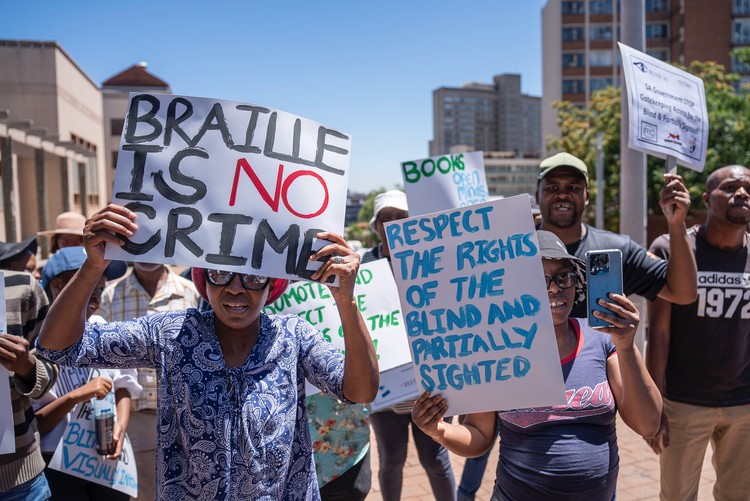
12 May 2025
Protesters outside the Constitutional Court last year demand the right of blind people to be able to obtain copyrighted works in accessible formats. Archive photo: Ihsaan Haffejee.
The Constitutional Court has strengthened access by disabled people to copyright protected works. The court has granted an order which effectively incorporates what has been proposed in the stalled copyright bill.
This will now impact anyone with a visual, physical, intellectual, neurological or sensory impairment and who requires works to be in an accessible format.
In December the court granted urgent and immediate relief to temporarily fill a gap created by the failure of President Cyril Ramaphosa to sign the Copyright Amendment Bill (CAB). When it handed down the order, the court said it would provide its reasons later.
Last week, in a unanimous decision, the apex court took the matter a step further. It read into the existing Act the relevant provisions of the pending Bill which broadens its impact.
It also takes South Africa a step closer to being able to accede to the Marrakesh Treaty, opening access to internationally accessible format materials under copyright for people with disabilities.
The litigation, spearheaded by Blind SA, has been winding through the courts in South Africa for several years.
Blind SA wanted blind and visually impaired people to be able to convert copyright protected works into accessible formats without having to obtain permission.
The Constitutional Court in September 2022 ruled that sections of the Act were unconstitutional and trampled on the rights of blind people. The court ordered a “reading in” to the existing Act as an immediate solution.
But it suspended the declaration of invalidity for two years to give Parliament time to remedy the defects through the introduction of a new bill.
The Bill was held up in Ramaphosa’s office after his legal advisors raised concerns about the constitutionality of certain sections, unrelated to blind and visually impaired people. He then referred those sections of the Bill to the Constitutional Court for its assessment.
Because of this, the 2022 “reading in” lapsed and the protections given to blind and visually impaired people fell away.
Blind SA went back to court and secured a similar “reading in” in December 2024. The court said this was just and equitable relief, given that the matter was urgent. But it would consider the case anew and give reasons later.
In its argument, Blind SA said if the Marrakesh Treaty had been signed and ratified by South Africa, blind and visually impaired people would be able to access hundreds of thousands of literary works in accessible formats from international libraries.
Further, it argued, if the court did not hear the matter, it would mean that people with disabilities would have to wait for the enactment of the CAB and this could take years.
Initially, Ramaphosa opposed the application but later “accepted that the matter was urgent”, Justice Nonkosi Mhlantla said, writing for the unanimous court.
Blind SA argued that the court was not obliged to grant the same relief as it had in 2022 but could order the current version of “Clause 19D” of the Bill. (The text of 19D is copied below this article.)
This because Parliament had already chosen this provision to cure the constitutional defects in the Act – and it was not one of the “controversial” clauses.
Justice Mhlantla said the initial “reading in” had been done in the absence of necessary provisions to protect the rights of people with visual disabilities and was designed to function as an interim measure to fill this gap.
She said there were concerns regarding the “reading in” of Clause 19D. It had been argued by Ramaphosa that this could be an “intrusion into the legislative domain” particularly given that the Bill had not yet been assented to.
While that concern was valid, the changed circumstances, the intention of the legislature, urgent rights protection and the temporary nature of the remedy, trumped that.
Clause 19D, she said, represented Parliament’s chosen solution. It demonstrated a marked evolution through proper constitutional tagging and rigorous parliamentary scrutiny.
The lapsing of the previous “reading in” had also created an immediate rights vacuum.
“Clause 19D provides a more comprehensive framework aligned with both constitutional imperatives and international obligations, particularly the Marrakesh Treaty.”
Justice Mhlantla said, for example, it provided a contemporary rights jurisprudence and incorporated essential cross-border provisions mandated by the treaty. It boosted equality and dignity for people with disabilities.
“The provision carefully balances accessibility requirements with copyright protections through specific attribution requirements and detailed safeguards against misuse, particularly in international transfers. It is a more robust and legally sustainable framework.
“Its structure harmonises with both evolving disability rights principles and South Africa’s international obligations.”
It would also place South Africa in an advantageous position should it choose to accede to the treaty in future,” she said.
“The fact that the order will be an interim one should allay any fears regarding the legislative process that will follow, including the signing of the treaty.”
The “reading in” of the clause will remain in effect until the new Act comes into force.
The court ordered Ramaphose to pay the costs of the application.